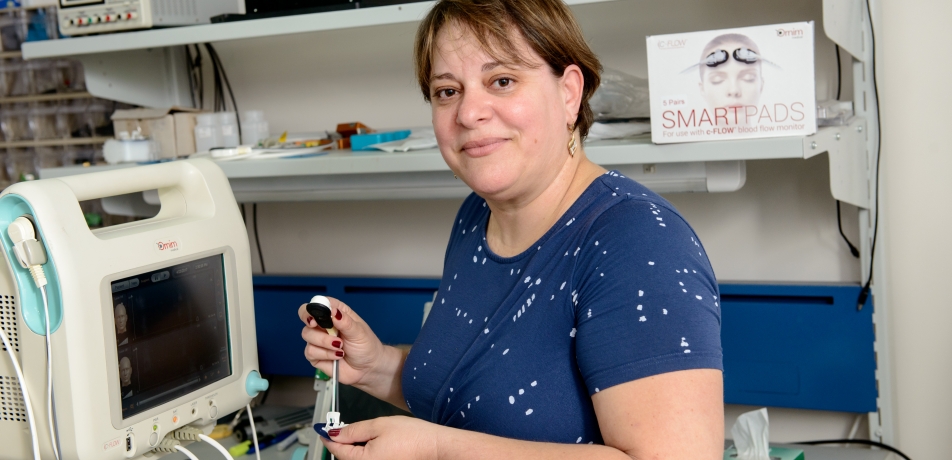Dr. Revital Shechter
A brainy startup is born
Alumni

When young mothers get together, comparing notes about childbirth is par for the course. But in a chat between Dr. Revital Shechter and two friends, Dr. Michal Balberg and Michal Olshansky, one of whom, like her, had recently given birth, the discussion took a different tack.
What missing technology, they asked, would make delivery rooms safer? And how can we get such a solution into hospitals all over the world?
Bridging the gap between science and real-world needs comes naturally to Dr. Shechter, a Weizmann Institute alumna who co-invented several patent and patent-pending applications related to optics, and has worked extensively in industry. Today, as Chief Scientist of Ornim, the medical device company she co-founded with those same two friends back in 2004, Dr. Shechter is now helping to market the company’s technology for use, not in the maternity ward, but in another part of the hospital altogether.
The founders’ original concept was to provide non-invasive measurement of fetal vitality in the womb, an approach with the potential to greatly increase the medically significant data that could be derived by ultrasound alone. But regulatory requirements related to devices for fetal health, as well as reimbursement challenges, made development costs prohibitive, and the project never got off the ground. Adjusting its business model, the company shifted focus to neurology and the operating room, first developing a device for monitoring cerebral tissue oxygenation, then creating c-FLOW™, a device that continuously monitors blood flow in the brain.
Timely, critical medical data
Fusing light and ultrasound, c-FLOW™ is a bedside device that provides physicians with real-time data that helps them better care for their patients, by responding quickly to the changes in cerebral blood flow that can lead to neurological damage. To date, c-FLOW™ is the only FDA-approved bedside device that enables continuous, easy to use, non-invasive monitoring of cerebral blood flow.
Dr. Shechter’s system gives doctors critical information they need to make clinical decisions that may minimize neural damage associated with stroke, traumatic brain injury, or high risk surgeries. According to its inventors, c-FLOW™ may also improve survival rates for patients who undergo resuscitation procedures.
Optics meets acoustics
As a PhD student in the laboratory of Prof. Asher Freisem of the Weizmann Institute’s Department of the Physics of Complex Systems, Dr. Shechter specialized in planar optics, an approach with applications ranging from holograms to virtual-reality helmets.
Optics are also central to c-FLOW™, in which medical ultrasound is paired with laser light pulses at specific wavelengths. The acoustic signal causes compression in deep tissues, which in turn, affects how laser light is diffused, via the acousto-optic effect. This “Doppler-like” phenomenon can reveal medically significant blood flow data about tissues measuring less than one cubic centimeter in size.
Down to business
Together with her original co-founders—who left the company in 2007 and 2014 respectively—Dr. Shechter successfully guided Ornim toward its current challenge - to introduce its novel technology into the medical device market. The $16 million investment the company raised before 2012 was augmented in that year with a $20 million infusion, mostly from the GE Health Imagination Fund and from Orbimed Israel, the Israeli branch of a U.S.-based company which is the world’s largest VC firm in the area of health care. In 2016, Ornim raised an additional $20 million from their existing investors, as well as sources in China.
Dr. Shechter has recently begun mentoring students, working both with the Israeli Brain Technology accelerator and the Weizmann Institute’s Student Entrepreneurship Club. She does this because, she says, “I love working with new ideas.”
And in terms of new ideas, Dr. Shechter has plenty to say about Ornim’s next steps.
“We want to design a monitor for use with newborns and pre-terms babies, who are particularly susceptible to cerebral hemorrhage,” she says. “Just like our plans when we started the company so long ago, c-FLOW™ may find its niche in maternity after all.”








